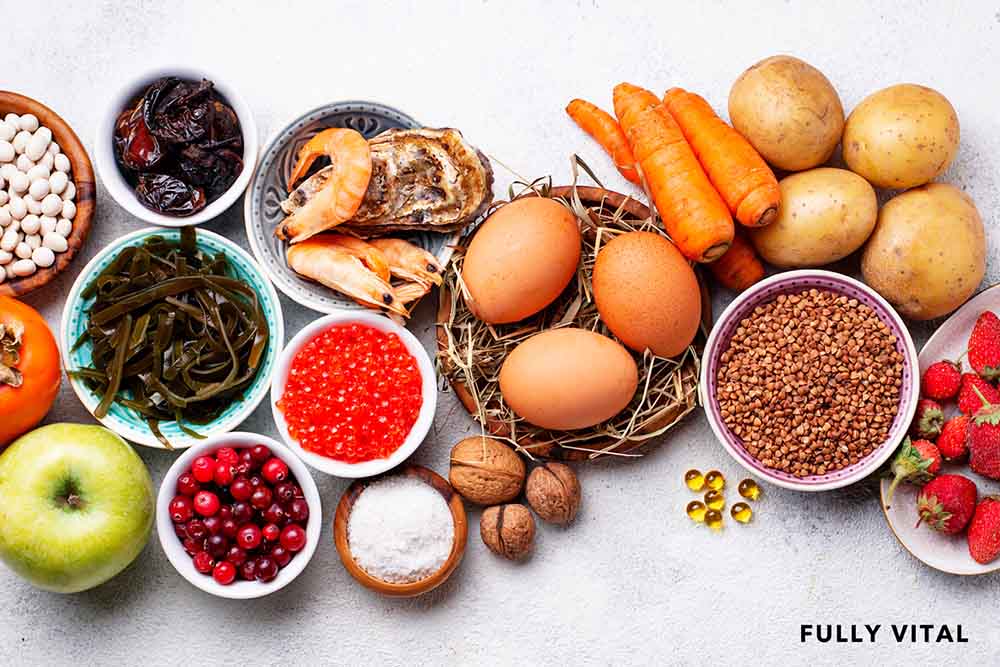
The Power Of Gingko Biloba For Hair Growth
If you're a woman seeking to stimulate hair growth and embrace luscious locks, you might have come across the term "gingko biloba" in your search for natural solutions.
This ancient herb holds the promise of healthier, more vibrant hair.
Let's delve into the world of gingko biloba and explore why it's gaining importance in the realm of hair growth.

I LOVE MY HAIR NOW
FullyVital hair serum and hair vitamins made tremendous improvements in my hair. I truly love my hair now.
Dorit S.,
What Is Gingko Biloba?
Gingko biloba is a tree native to China that has been used in traditional medicine for centuries.
Its leaves contain natural compounds that have gained attention for their potential health benefits.
Gingko biloba is known for its antioxidant and anti-inflammatory properties, making it a popular choice for various health concerns, including hair growth.(1)

Why Is Gingko Biloba Important?
Gingko biloba is important because it offers a range of potential benefits that can contribute to healthy hair growth.
Its antioxidant properties help combat free radicals, which can damage hair follicles and impede growth.
Additionally, gingko biloba promotes blood circulation, ensuring that essential nutrients and oxygen reach the hair follicles, thereby supporting their growth and vitality.
How Does Gingko Biloba Work?
Gingko biloba works by improving blood circulation and fighting oxidative stress.
Its active components help dilate blood vessels, allowing for better nutrient delivery to the hair follicles.
By enhancing blood flow, gingko biloba helps nourish the hair follicles, promoting hair growth and reducing hair loss.
Moreover, its antioxidant properties protect hair follicles from damage, which can contribute to healthier and stronger hair.
What Are The Benefits Of Gingko Biloba?
There are several benefits associated with gingko biloba when it comes to hair growth:
Stimulates Hair Growth
Gingko biloba enhances blood flow to the scalp, providing the necessary nutrients and oxygen for optimal hair growth.
Strengthens Hair
By protecting hair follicles from damage, gingko biloba helps strengthen the hair shaft, reducing breakage and promoting overall hair health.
Nourishes The Scalp
Improved blood circulation nourishes the scalp, promoting a healthy environment for hair growth and reducing scalp issues.
Reduces Hair Loss
The antioxidant properties of gingko biloba help combat free radicals, which can contribute to hair loss.
Are There Any Downsides To Gingko Biloba?
While gingko biloba is generally safe for consumption, it's important to consider potential downsides:
Allergies
Some individuals may be allergic to gingko biloba.
If you experience any allergic reactions such as rash, itching, or difficulty breathing, discontinue use and seek medical attention.
Interactions With Medications
Gingko biloba may interact with certain medications, including blood thinners.
If you're taking any medication, consult your healthcare provider before using gingko biloba.
Side Effects
In rare cases, gingko biloba may cause side effects such as headaches, dizziness, or upset stomach.
If you experience any adverse reactions, stop using gingko biloba and consult your doctor.
What Are The Alternatives To Gingko Biloba?
If you're looking for alternatives to gingko biloba, here are a few options worth considering:
Rosemary
Rosemary has been used for centuries to stimulate hair growth.
It improves circulation and strengthens hair follicles.
Saw Palmetto
Saw palmetto is known for its ability to block the conversion of testosterone to dihydrotestosterone (DHT), which can contribute to hair loss.
Biotin
Biotin, also known as vitamin B7, is essential for healthy hair.
It helps strengthen the hair shaft and promote hair growth.
Peppermint Oil
Peppermint oil has been shown to stimulate hair growth by increasing blood flow to the hair follicles.
Protein Supplements
Adding protein-rich foods or supplements to your diet can support healthy hair growth and strengthen existing hair.
How Does Gingko Biloba Grow And Propagate?
Gingko biloba is a unique tree that has a fascinating growth and propagation process.
Here's what you need to know:
Life Cycle
Gingko biloba goes through a complete life cycle, starting from a seed and growing into a mature tree.
Seeds
Gingko biloba trees produce fleshy, fruit-like seeds that contain an outer layer (the sarcotesta) and an inner hard shell (the endocarp).
Seed Germination
The seeds of gingko biloba require specific conditions to germinate.
They often need exposure to a cold period, known as stratification, to break their dormancy and begin sprouting.
Pollination
Gingko biloba trees have separate male and female trees.
The male trees produce pollen cones, while the female trees bear ovules on stalks.
Fertilization
Wind plays a crucial role in the fertilization process of gingko biloba. Pollen from male trees is carried by the wind to the ovules of female trees, leading to fertilization and seed production.
Propagation
Gingko biloba can be propagated through seeds or vegetative methods.
Seed propagation involves planting stratified seeds in a suitable growing medium.
Vegetative propagation can be done through methods like grafting or taking cuttings from existing trees.
How Does Gingko Biloba Affect Cognitive Function And Memory?
Gingko biloba has been studied for its potential effects on cognitive function and memory.
Here's what research suggests:
Improved Blood Circulation
Gingko biloba is known to enhance blood flow and microcirculation, including in the brain.
This increased blood flow can provide better oxygen and nutrient supply to brain cells, potentially supporting cognitive function.(2)
Antioxidant Properties
The antioxidant properties of gingko biloba help protect against oxidative stress and reduce inflammation.
These effects may contribute to maintaining cognitive health.
Neuroprotective Effects
Some studies suggest that gingko biloba may have neuroprotective effects, helping to safeguard brain cells from damage caused by free radicals and reducing the risk of cognitive decline.
Memory Enhancement
While individual responses may vary, gingko biloba has shown potential in improving memory and cognitive performance, particularly in older adults.
It may aid in memory recall and cognitive processing.
What Are The Physical Characteristics Of Gingko Biloba?
Gingko biloba exhibits distinct physical characteristics that make it easily recognizable.
Here's what you should know:
Leaf Shape
Gingko biloba leaves have a unique fan-shaped appearance with distinct veins radiating from a central point.
Leaf Color
The leaves of gingko biloba turn a vibrant golden-yellow in the autumn season, creating a striking visual display.
Bark
The bark of mature gingko biloba trees is typically light gray in color and has a rough texture.
Tree Size
Gingko biloba is a large deciduous tree that can reach impressive heights, often exceeding 100 feet (30 meters) in height when fully grown.
Growth Habit
The branches of gingko biloba spread out horizontally, creating a broad and symmetrical canopy.
Distinctive Fruits
Female gingko biloba trees produce fruits that resemble small apricots.
These fruits have a foul odor and contain seeds inside.
Can Gingko Biloba Improve Cardiovascular Health?
Gingko biloba has been studied for its potential benefits in promoting cardiovascular health.
Here's what research suggests:
Platelet Function Regulation
Gingko biloba has been shown to inhibit platelet aggregation, which may help reduce the risk of blood clot formation and improve overall blood flow.(3)
Lowering Blood Pressure
Some studies suggest that gingko biloba may have a modest effect in lowering blood pressure in individuals with hypertension.
What Is The History Of Gingko Biloba?
The history of gingko biloba dates back thousands of years, making it a compelling and relevant topic for a hair growth product company.
Here are key points about its historical significance:
- Ancient Existence: Gingko biloba is one of the oldest tree species on Earth, with fossil records dating back over 270 million years.
- Traditional Medicine: For centuries, gingko biloba has been used in traditional Chinese medicine for its various health benefits, including promoting hair growth and overall well-being.
- Cultural Symbolism: Gingko biloba is often regarded as a symbol of longevity, resilience, and hope, making it an important cultural and historical icon.
What Is The Current Environment Of Gingko Biloba?
In today's world, gingko biloba continues to hold relevance as a hair growth product company topic.
The current environment surrounding gingko biloba includes:
- Scientific Research: Ongoing scientific studies and research are exploring the potential benefits of gingko biloba for hair growth and overall hair health.4
- Nutritional Supplements: Gingko biloba is widely available in the form of nutritional supplements, attracting attention as a natural option for supporting hair growth in women.
- Hair Care Industry: With the increasing demand for natural and botanical-based hair products, gingko biloba is gaining traction as a sought-after ingredient in hair care formulations.
What Does The Future Hold For Gingko Biloba?
As the hair growth product industry evolves, the future of gingko biloba appears promising and impactful.
Here's what the future may hold:
- Innovative Formulations: Advancements in hair care research may lead to the development of innovative formulations that harness the potential of gingko biloba to promote hair growth.
- Expanded Application: With ongoing scientific discoveries, gingko biloba's benefits for hair health may lead to its incorporation into a broader range of hair care products, catering to diverse hair types and needs.
- Continued Exploration: Researchers and hair care experts will likely continue to explore the potential of gingko biloba, further solidifying its position as an essential and relevant topic within the hair growth product industry.
Unlock The Secret To Youthful Hair With Fully Vital's Hair Growth Products!Discover the transformative power of Fully Vital's hair growth products, designed to combat aging effects on your hair and rejuvenate your locks. Our mission is simple: to create powerful, science-backed solutions that help you slow down and reverse the aging process of your hair.Key Features and Benefits:
|
Final Thoughts On Gingko Biloba
Gingko biloba emerges as a fascinating and essential topic within the realm of hair growth solutions.
With its rich history, current relevance, and promising future, gingko biloba stands as a symbol of resilience and hope, just like your hair should be.
As women of all hair types seeking to stimulate hair growth, you now understand the potential benefits of incorporating gingko biloba into your hair care regimen.
At Fully Vital, we share your passion for maintaining a healthy relationship with your locks.
Our wide range of hair growth products is carefully crafted to combat the aging effects on your hair, empowering you to embrace vibrant, youthful, and voluminous hair.
Take the next step towards nourishing your hair's health and vitality.
Frequently Asked Questions About Gingko Biloba
Can gingko biloba be used topically for hair growth?
While gingko biloba is primarily consumed orally as a supplement, some hair care products may contain gingko biloba extracts.
These products can be applied topically to the scalp to potentially enhance hair growth.
Is Ginkgo biloba safe to consume?
Gingko biloba is generally safe for consumption when taken in recommended doses.
However, it's important to consult with your healthcare provider, especially if you have any underlying medical conditions or are taking medications.
How long does it take to see results with gingko biloba for hair growth?
Hair growth results can vary from person to person.
It may take several weeks to months of consistent use before noticeable improvements in hair growth are observed.
Patience and regular usage are key.
Can pregnant or breastfeeding women use gingko biloba?
Pregnant or breastfeeding women should consult with their healthcare provider before using gingko biloba or any other supplements to ensure safety for both themselves and their baby.
Can gingko biloba help with hair thinning?
Gingko biloba's ability to improve blood circulation and provide essential nutrients to the hair follicles may help combat hair thinning.
However, individual results may vary, and it's best to consult with a healthcare professional for personalized advice.
Where can I find gingko biloba supplements?
Gingko biloba supplements can be found at pharmacies, health food stores, and online retailers.
It's important to choose reputable brands and follow the recommended dosage instructions.
How is Gingko Biloba used in traditional medicine?
Gingko biloba has a long history of use in traditional medicine.
Here's how it has been traditionally utilized:
- Traditional Chinese Medicine: Gingko biloba has been used in traditional Chinese medicine to address various health conditions, including cognitive function, respiratory issues, and circulatory disorders.
- Memory and Cognitive Support: In traditional medicine, gingko biloba has been revered for its potential to enhance memory, cognitive function, and mental clarity.
- Asthma and Bronchitis: Traditional practitioners have used gingko biloba to alleviate symptoms of asthma and bronchitis, owing to its anti-inflammatory properties.
What are the modern applications of Gingko Biloba?
In addition to its traditional use, gingko biloba has found modern applications in various areas.
Here are some examples:
- Memory Enhancement: Gingko biloba is often used as a natural supplement to support memory, cognitive function, and overall brain health.
- Age-Related Cognitive Decline: It is believed that gingko biloba may help slow down age-related cognitive decline and improve cognitive performance in older adults.
- Peripheral Artery Disease (PAD): Gingko biloba extract is sometimes used to alleviate symptoms of PAD, a condition characterized by reduced blood flow to the legs.
- Tinnitus: Some individuals use gingko biloba to manage symptoms of tinnitus, such as ringing in the ears, although its effectiveness varies among individuals.
What is the best time to take Ginkgo biloba?
The timing of taking ginkgo biloba can vary depending on individual preferences and goals.
Here are some general considerations:
- Consistency: It is recommended to take ginkgo biloba at the same time every day to maintain consistency in your supplement routine.
- Morning or Afternoon: Many individuals prefer taking ginkgo biloba in the morning or early afternoon to benefit from its potential cognitive-enhancing effects throughout the day.
- With Food: Taking ginkgo biloba with food can help enhance its absorption and reduce the likelihood of stomach discomfort.
How many times a day should I take ginkgo?
The dosage and frequency of ginkgo biloba intake may vary based on factors such as the specific product, concentration, and individual needs.
Here are some general guidelines:
- Recommended Dosage: The typical dosage range for ginkgo biloba supplements is 120-240 mg per day, divided into two to three doses.
- Consult a Healthcare Professional: It's important to consult with a healthcare professional or follow the recommended dosage instructions provided by the product manufacturer for personalized advice.
Sources:
- Wikipedia Contributors. (2019, March 19). Ginkgo biloba. Wikipedia; Wikimedia Foundation. https://en.wikipedia.org/wiki/Ginkgo_biloba
- Sadowska-Krępa, E., Kłapcińska, B., Pokora, I., Domaszewski, P., Kempa, K., & Podgórski, T. (2017). Effects of Six-Week Ginkgo biloba Supplementation on Aerobic Performance, Blood Pro/Antioxidant Balance, and Serum Brain-Derived Neurotrophic Factor in Physically Active Men. Nutrients, 9(8), 803. https://doi.org/10.3390/nu9080803
- K. Dutta-Roy, Margaret J. Gordon, C, A. (1999). Inhibitory effect of Ginkgo biloba extract on human platelet aggregation. Platelets, 10(5), 298–305. https://doi.org/10.1080/09537109975933
- Ginkgo. (2020, August). NCCIH. https://www.nccih.nih.gov/health/ginkgo






